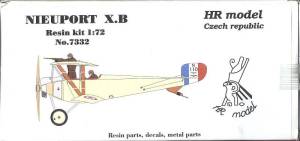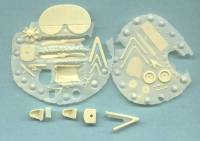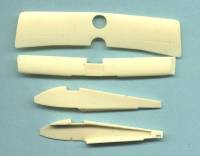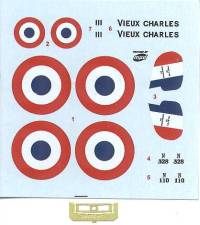HR 1/72nd Nieuport X.B
|
 |
History
Prior to the outbreak of World War 1, the Nieuport company favored
the monoplane as the prefered aircraft layout. Because of criticism of
the restricted view due to the layout of Nieuport monoplanes, some companies
- including Nieuport-Macchi of Italy - to adopt the high, parasol wing.
In addition, due to various war departments favoring biplanes not only
because of sturdy construction and improved manueverability, but also
due to their superior rate of climb. The Nieuport X was the first sesquiplane
layout - that is, where the lower wing is smaller than the uppwer wing
- which afforded not only the previously mentioned biplane advantages,
but it also helped with downward visibility.
 The
Nieuport X was the result of the new sesquiplane approach the factory
took. It was a two-wing result of the previous Type X monoplane, but retaining
only the fuselage and rudder. This early Nieuport X.B (X being the type,
B meaning - basically - "biplane") can be differentiated from
the later Nieuport Xs by the hole in the upper wing (which allowed the
observer to stand up and shoot at enemy aircraft) as well as the horizontal
tail was larger. The
Nieuport X was the result of the new sesquiplane approach the factory
took. It was a two-wing result of the previous Type X monoplane, but retaining
only the fuselage and rudder. This early Nieuport X.B (X being the type,
B meaning - basically - "biplane") can be differentiated from
the later Nieuport Xs by the hole in the upper wing (which allowed the
observer to stand up and shoot at enemy aircraft) as well as the horizontal
tail was larger.
The Kit
The HR Nie.X.B consists of 34 resin and one photoetch (the piece in
front of the fuselage behind the engine). While there are decals for what
appear to be two schemes, only one is for the Nie.X.B (the other for a
"later" Nie.X flown by Guynemer).
 Overall
the resin is nicely cast. Unfortunately the bottom wing in my kit is littered
with small air/pinholes. Hopefully a coat or two of Mr. Surfacer will
fill these in - trying to do so without ruining the nicely cast rib tapes.
Thankfully the rest of the parts don't have air/pinholes. The smaller
parts are cast into a "wafer" so they'll need to be cut out. Overall
the resin is nicely cast. Unfortunately the bottom wing in my kit is littered
with small air/pinholes. Hopefully a coat or two of Mr. Surfacer will
fill these in - trying to do so without ruining the nicely cast rib tapes.
Thankfully the rest of the parts don't have air/pinholes. The smaller
parts are cast into a "wafer" so they'll need to be cut out.
This model can have its fuselage halves glued together prior to detailing
out the cockpit. One area that needs attention are the cockpit sidewalls
- they're too thick for an aircraft that had the entire cockpit open.
Sure, some of it will be difficult to see once the upper wing is on, but
since there isn't a "bulkhead" between the observer and the pilot (plus
the hole in the upper wing), seeing through to the front cockpit is easy
to do from the rear. This means - for those that want to take on the challenge
- a completely detailed cockpit is needed. This is where the design of
the kit comes into favor, as the top, forward fuselage is a separate piece.
Kit cockpit components are very sparse, consisting of only a floor, two
inaccurate seats (these should have a smaller back and should be "perforrated")
and a forward-most "bulkhead". The rest of the cockpit is up to the modeler.
 Once
the fuselage halves are glued together, whatever cockpit is added and
the top, forward fuselage is glued on, the rest of assembly should be
a brease. I tried to dry-fit the lower wing to the taped together fuselage
halves, and it appears this are will require a bit of attention for it
to sit flush. Once
the fuselage halves are glued together, whatever cockpit is added and
the top, forward fuselage is glued on, the rest of assembly should be
a brease. I tried to dry-fit the lower wing to the taped together fuselage
halves, and it appears this are will require a bit of attention for it
to sit flush.
Conclusion
This is a decent kit that with a little work will result in an awesome
model. One area that should be refined is the tail surfaces. These are
a bit thick and should be sanded down. Otherwise, with some cockpit detailing
and time and patience, this will result in a unique model that portrays
this version of the Nieuport X well. So far I have been able to only find
only one photo of a Nieuport X.B that was finished in the French national
colors and roundels - that photo being the aircraft that the decals portray.
Thanks to Hobbyshop.cz and
Lubos Vinar for the review sample.
|
|
